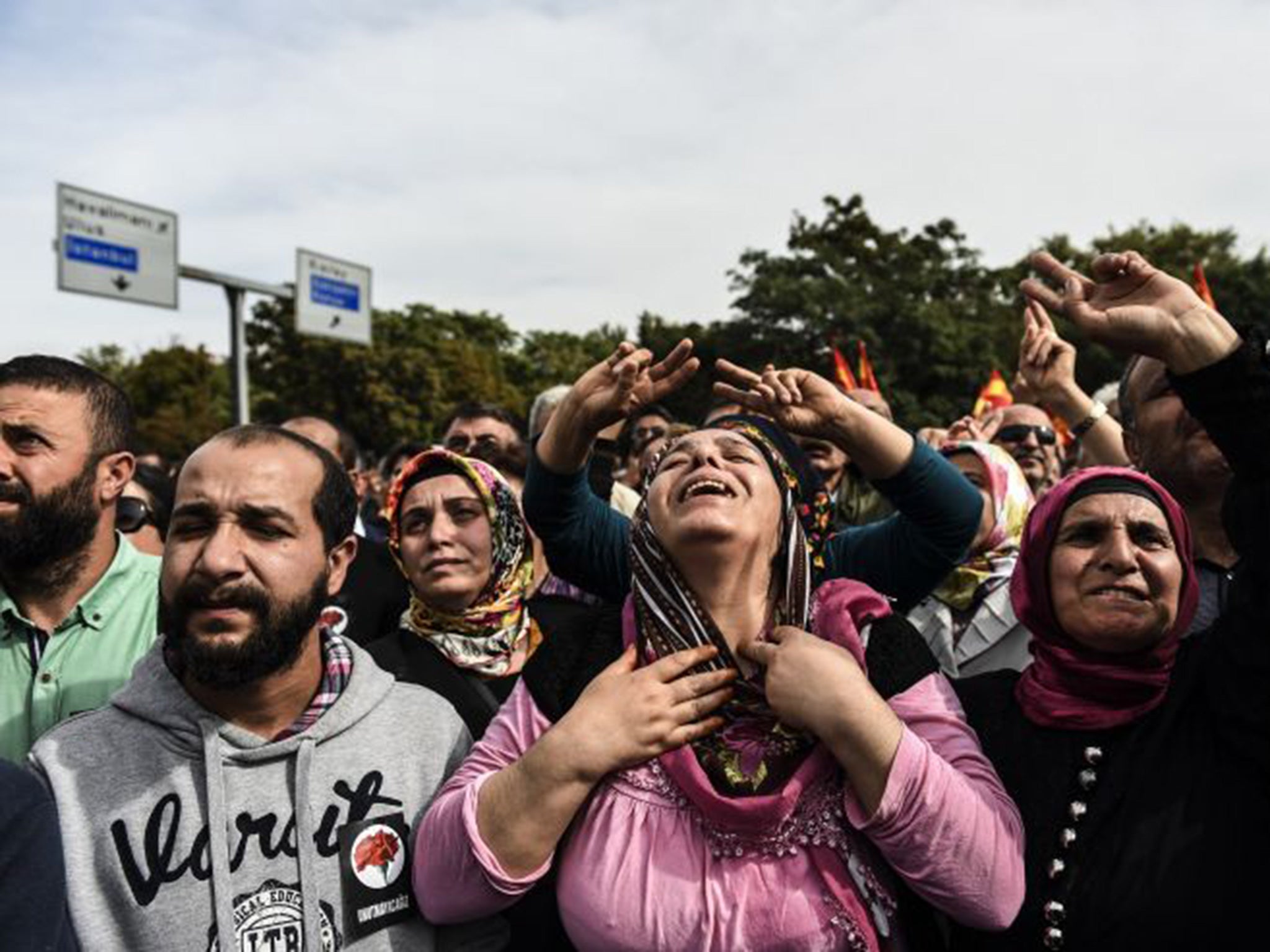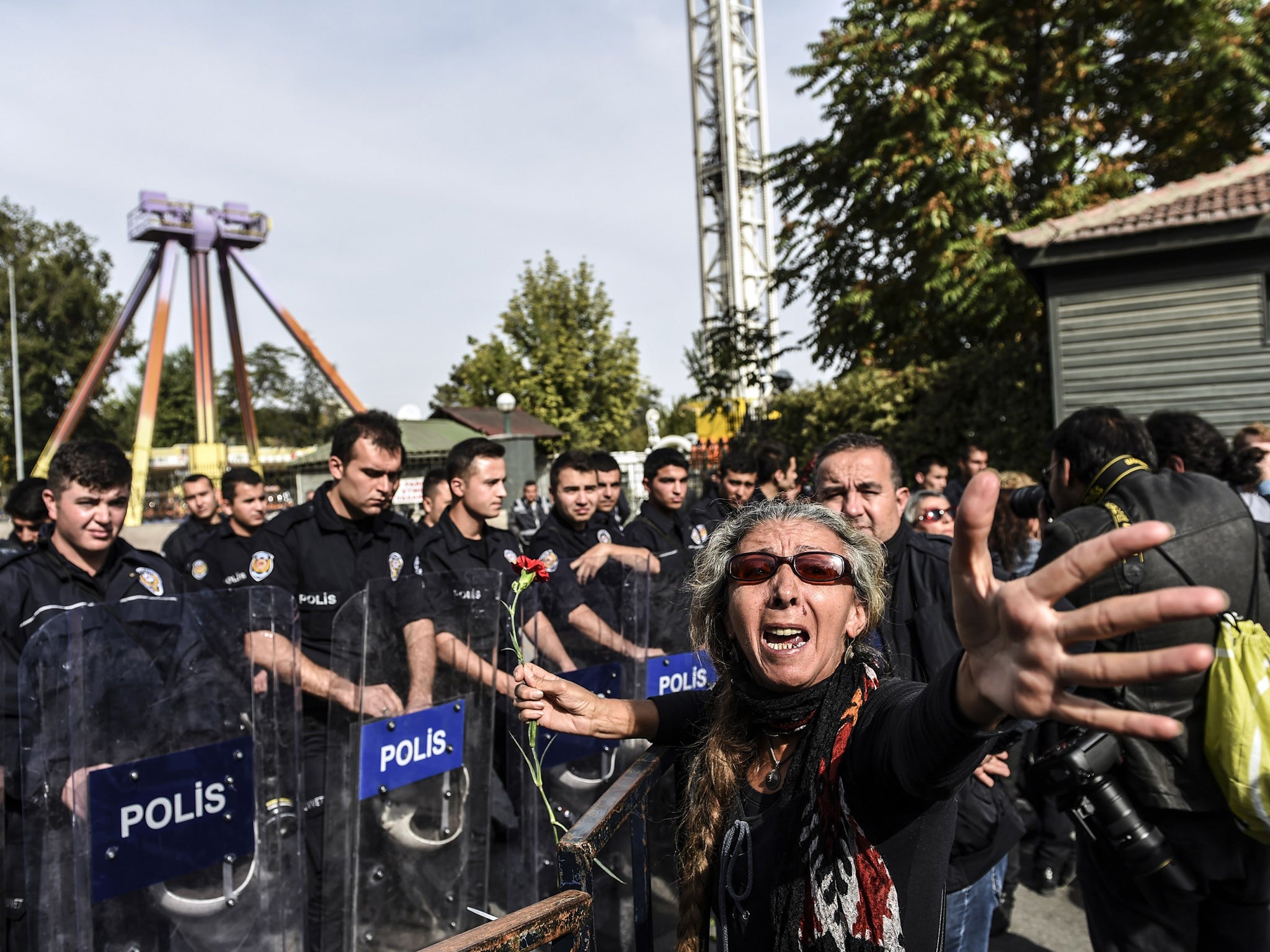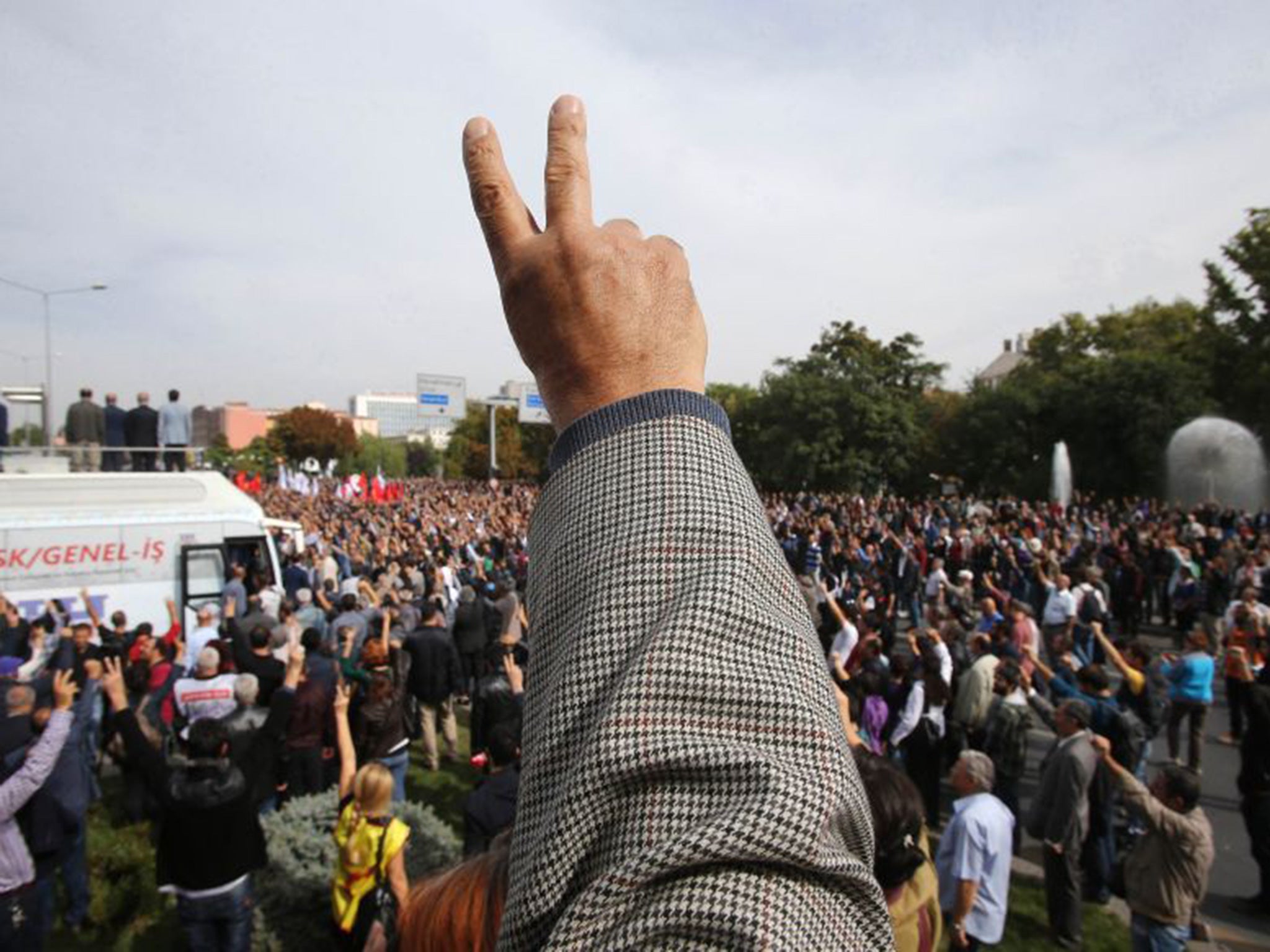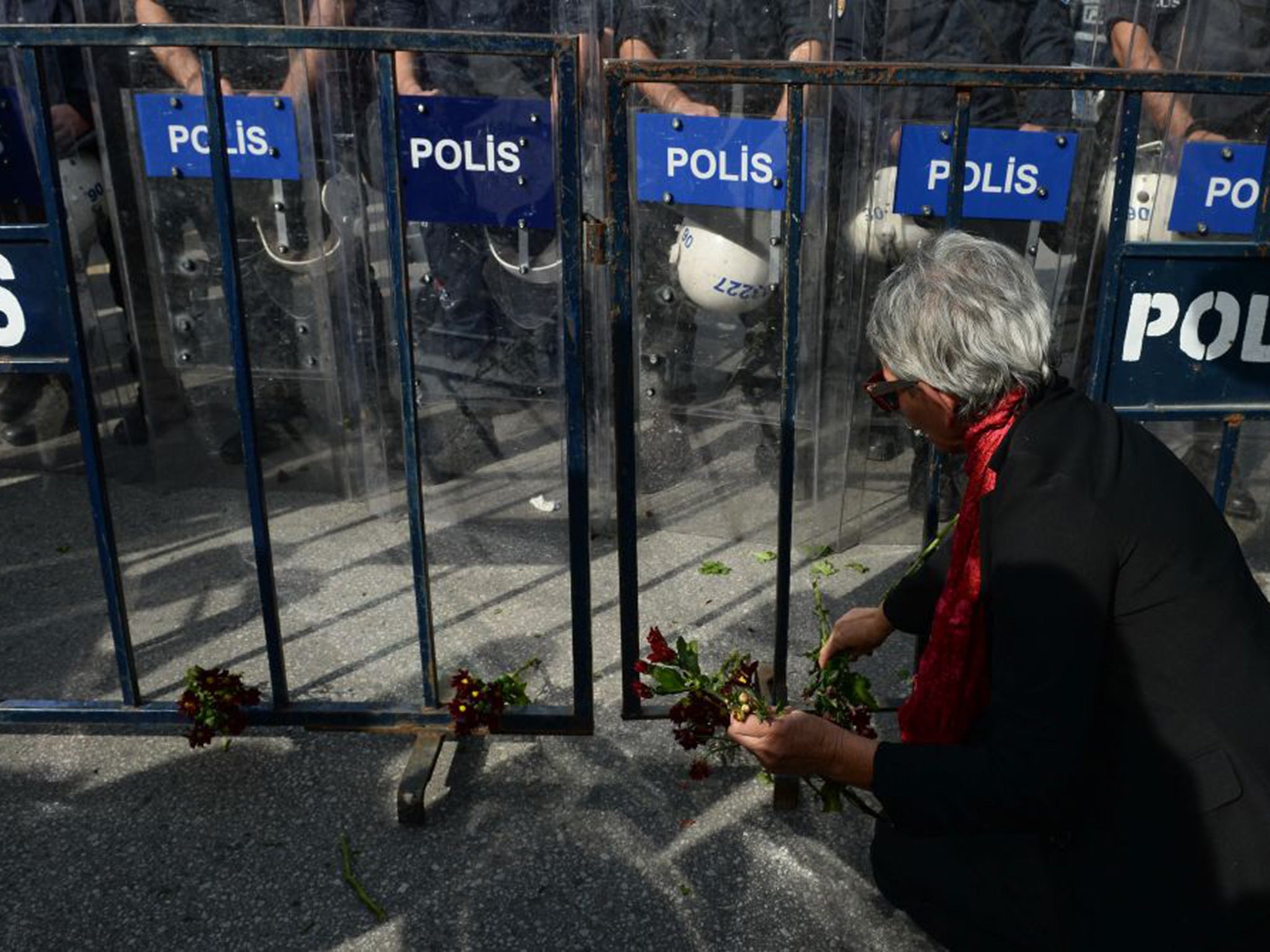Ankara bombing: Investigation into Turkey's deadliest terrorist attack to be 'completely focused' on Isis
Many mourners lay the blame on the government’s door, voicing their anger at the state for failing to prevent the attack

The West’s key frontline ally in the battle against Isis has been plunged into a state of turmoil, engulfed by violence and recrimination after the most deadly terrorist attack in Turkey’s history.
Amid fears that the war in Syria and Iraq has crossed the border on to Turkish soil, the death toll from the blasts at a Kurdish peace march increased from 95 to 128, according to the pro-Kurdish HD party. Security sources said the investigation into the bombings would be “completely focused” on Isis. The attacks bore striking similarities to a suicide attack in Suruc in July this year that killed 33 pro-Kurdish activists.
I arrived to see people covered in blood, people whose hands and legs were blown off. There were pieces of human flesh everywhere
Dozens of suspects have been arrested in operations targeting Isis. There were claims that the deliberate bombing of the peace march and the type of explosive used had led investigators to an Isis faction in Turkey, known as the Adiyaman Ones, referring to Adiyaman province in south-central Turkey.
Ankara has demanded increased support from Nato in the battle against Isis. The country now faces an increased domestic threat. “All Nato allies stand united in the fight against the scourge of terrorism,” said the Nato Secretary General Jens Stoltenberg.
Riots broke out in Ankara as thousands accused the President, Recep Tayyip Erdogan, of failing to protect the peace march before two suicide bombers struck.
“How was there no police to protect us?” Yildiz Kilinc, a member of the HDP, which believes it was the main target of Saturday’s attack, told The Independent.

“I only survived because I was 10 minutes late. I would have been right there,” she said. “I arrived to see people covered in blood, people whose hands and legs were blown off. There were pieces of human flesh everywhere.”
Kilinc was one of thousands who attended the funeral of 25-year-old Korkmaz Tedik in Ankara’s suburb of Batikent, along with HDP leaders Selahattin Demirtas and Figen Yuksekdag and several MPs from the main opposition party CHP.
In between speeches to honour the victims, the crowd chanted slogans denouncing the ruling AKP and President Recep Tayyip Erdogan.
At the service, the father of Korkmaz Tedik said: “They are drinking blood but cannot get enough. They are trying to start a war in this country, to pit people against each other and prevent minorities from coming together. But we will come together.”
Yet on the first of three days of mourning, there was no sign that the country’s political parties would stand together in unity. Soon after the bombings, the party leaders traded criticisms, laying bare the increasingly polarised state of Turkish politics.

Addressing mourners in the capital, the HDP’s Demirtas accused the government of failing to protect the protesters.
"The state which gets information about the bird that flies and every flap of its wing was not able to prevent a massacre in the heart of Ankara," he said.
The unions which organised Saturday’s rally have called for a nationwide strike on Monday and Tuesday in protest.
Those that gathered in Sihhiye Square near the site of Saturday’s explosions also vented their anger at the government, chanting “murderer Erdogan” and “murderer police”. Skirmishes broke out when riot police barred mourners from laying flowers at the scene.
“We just wanted to pay our respects but police officers hit us,” said 29-year-old Gulumcan Kayi. A day earlier, she stood some 300 metres away when explosions tore through the crowd.
“I saw my high school classmate with bomb pieces in her leg. Her friend was lying there, bleeding badly. I think he died. We tried to help him but the police would not let us through to him.”

She said several of her fellow protesters were still in shock. On the metro to the funeral in Batikent, a woman collapsed in tears, screaming: “They were there for peace! Who killed them? Who murdered them?”
Government officials vowed that the perpetrators would be brought to justice and insisted that the elections scheduled for November 1 would be held as planned despite heightened tensions amid a resurgent conflict with the banned Kurdistan Workers’ Party (PKK) and increased threats of a spillover from Syria’s war.
In Syria, a rebel group said it stood with the Turkish government and people against “terrorism”. Jaysh al-Islam, or the Army of Islam, issued a statement expressing “complete solidarity with the Turkish government”.
Prime Minister Ahmet Davutoglu said on Saturday that Turkish police had arrested several potential suicide bombers in the days leading up to the attack, adding that either Isis, Kurdish militants or leftist terror groups could have attacked the Ankara rally.
“This assault is not on just one group, on our citizens participating in the rally or a particular political organisation. This attack is on the unity of our country,” he added.
The Turkish Haberturk newspaper quoted police sources as saying that one of the Ankara bombers was suspected to be the brother of the Suruc bomber, reporting that the explosives used and the target resembled tactics used by an Isis-affiliated group with roots in the southern province Adiyaman.
The explosions hit the Ankara rally as the marchers were preparing to call for an end to the fighting between Turkish security forces and the PKK, which is listed as a terrorist group by Turkey, the US and the EU. As many as 40,000 have been killed in the three-decade conflict, with hundreds dead since a two-year ceasefire collapsed in July.
Turkey resumed its air strikes against the PKK even though the group’s leaders had ordered its militants to stop its attacks ahead of the elections. Two soldiers were subsequently killed in clashes with militants in the country’s east.
Turkey also arrested 36 suspected Isis members, pro-government media reported. The government has denied accusations of security failures in Saturday’s attack, which is the third bombing to hit civilians after Suruc and the June attack on a HDP rally in Diyarbakir.
While its leaders debate who is to blame, Ankara struggles with the aftermath of the bombings. Friends and relatives of the wounded still gather in front of hospitals for news; with 65 people in intensive care, many fear the death toll will rise further.

Join our commenting forum
Join thought-provoking conversations, follow other Independent readers and see their replies
Comments
Bookmark popover
Removed from bookmarks